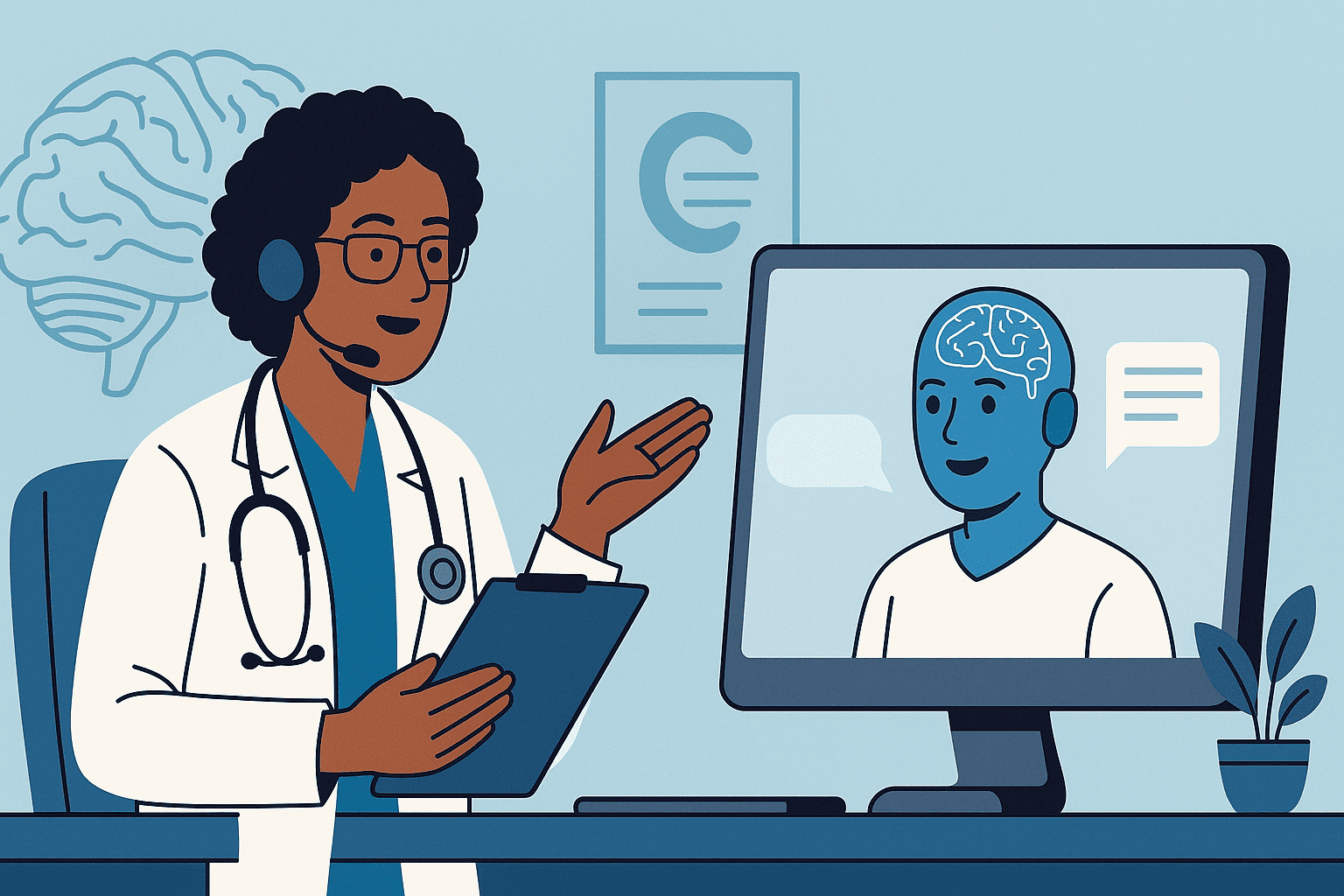Updated on: July 14, 2025
Neurologists deal with some of the most nuanced, high-stakes cases in medicine. From subtle cognitive decline to sudden-onset stroke or refractory epilepsy, each encounter demands accurate, detailed documentation—fast.
But neuro documentation is time-consuming. It involves long histories, comprehensive neuro exams, imaging, labs, and ongoing care plans that span months or years.
That’s why neurologists are turning to AI medical scribes for neurology, like DocScrib. DocScrib captures complex neuro visits in real time—handling documentation so you can stay focused on diagnosis, coordination, and patient care.
Why Neurology Documentation Is So Complex
Neurology notes often require:
-
Detailed history of present illness (onset, progression, triggers)
-
Full neurologic exams (cranial nerves, motor, reflexes, sensation, gait)
-
Imaging summaries (CT, MRI, MRA, EEG, PET)
-
Diagnostic impressions (stroke, MS, epilepsy, Parkinson’s, neuropathies)
-
Medication logs (AEDs, dopaminergic agents, steroids, biologics)
-
Cognitive and functional assessments
-
Multidisciplinary coordination (neuropsych, rehab, PCP, neurosurgery)
Even routine follow-ups can take 15–30 minutes of typing—per patient.
What Is an AI Medical Scribe for Neurology?
An AI neurology scribe listens during visits—either in person or via telemedicine—and auto-generates structured clinical notes.
Unlike generic voice tools, DocScrib understands neurological vocabulary, testing patterns, and disease progression. It captures motor exams, tremor descriptions, seizure types, headache logs, imaging results, and medication changes—all accurately and contextually.
How DocScrib Works for Neurologists
-
Start the visit
The AI listens passively through a secure mic or phone app—no interruptions. -
Real-time comprehension
It extracts neuro-specific terms, timelines, findings, and treatment plans. -
Note generation
SOAP, consult, or follow-up notes are created instantly and tailored to the condition. -
Review & EMR integration
You review the draft, approve, and push it directly into your EMR.
Why Neurologists Choose DocScrib
🧠 Auto-Captures Neuro Exams
DocScrib records cranial nerves, reflexes, motor tone, gait findings, and cognitive screening—all by anatomical region.
🧪 Summarizes Imaging and Labs
Integrates CT/MRI reports, EEG patterns, and labs (e.g., B12, ANA, lumbar puncture) into the objective section.
🕒 Saves 1.5–2 Hours Per Day
No more late-night notes—DocScrib handles it while you work.
💊 Documents Complex Medication Plans
AEDs, dopamine agents, MS biologics, migraine meds—all auto-logged with titration details.
🔁 Tracks Longitudinal Symptoms
Follows up on memory, seizure frequency, tremor progression, and medication side effects over time.
🔐 HIPAA-Compliant and Secure
Fully encrypted, audit-ready, and BAA-supported.
DocScrib Features for Neurology
-
Neuro Exam Templates
Auto-logs motor strength, reflexes, sensation, coordination, Romberg, Babinski, and more. -
Symptom Timeline Capture
Ideal for stroke, seizure, headache, cognitive decline, and movement disorders. -
Imaging and Diagnostic Test Parser
Captures and formats EEG/MRI summaries and lab interpretations. -
Drug Tracker with Neurology Relevance
Documents AED titrations, Parkinson’s regimens, MS treatments, and adverse effects. -
Multispecialty Coordination Notes
Records communication with neuropsych, rehab, neurosurgery, PCP, and caregivers.
Top Use Cases for Neurology Practices
-
Stroke Follow-Ups: Imaging review, function, rehab planning
-
Epilepsy Management: Seizure logs, medication titration, EEG results
-
Parkinson’s Disease: Tremor/stiffness tracking, UPDRS scoring, med review
-
Multiple Sclerosis: Relapse status, MRI summaries, biologic use
-
Dementia & Cognitive Decline: MOCA scores, ADLs, caregiver reports
-
Headache Clinics: Frequency tracking, triggers, prophylactic meds
-
Neuropathy & Nerve Pain: Sensory exam, EMG, meds (gabapentin, duloxetine)
Real-World Case: Epilepsy Center in Atlanta
📍 Team of 4 neurologists and 2 epilepsy nurse practitioners
In 30 Days:
-
80% reduction in after-clinic charting
-
Better consistency in EEG documentation and seizure logs
-
Improved SOAP note quality for follow-ups
-
Fewer errors in AED titration documentation
💬 “I’m managing 15–18 complex neuro patients a day. With DocScrib, I talk through my exam, plan, and MRI—and the note is done before I walk out.”
DocScrib vs. Manual Neuro Note-Taking
| Feature | Manual Notes | DocScrib AI Scribe |
|---|---|---|
| Full Neuro Exam Capture | Time-intensive | ✅ Structured + anatomical |
| Imaging & EEG Summaries | Copy/paste or typed | ✅ AI-parsed + formatted |
| Seizure Tracking | Manually recorded | ✅ Auto-logged by type/date |
| Parkinson’s or MS Progression | Inconsistent | ✅ Followed longitudinally |
| Medication Documentation | Prone to errors | ✅ Accurate + specific |
| EMR Upload | Several clicks | ✅ 1-click sync |
FAQs: AI Scribes for Neurology
Q1. Can DocScrib capture full neuro exams with detail?
Yes—motor strength, reflexes, cranial nerves, sensory loss, gait findings, and mental status are all structured clearly.
Q2. Will it work for subspecialties like MS or epilepsy?
Absolutely. You can customize templates for epilepsy, stroke, movement disorders, MS, neuromuscular, and cognitive clinics.
Q3. Does it support MOCA, NIHSS, or UPDRS scoring?
Yes—DocScrib prompts for and inserts these scores where appropriate based on context.
Q4. What about documenting EEGs, CTs, or MRI findings?
The AI recognizes when imaging or EEG is reviewed and inserts structured summaries into your note.
Get Started with DocScrib for Neurology
-
Book your free demo
-
Choose “Neurology” as your specialty
-
Customize templates for consults, follow-ups, stroke, seizures, MS, and more
-
Start documenting faster, smarter, and without the typing
Conclusion: Because Neurology Deserves Notes That Match Its Precision
You interpret subtle signs, balance powerful medications, and make life-changing diagnoses. Your notes should reflect that depth—without burning you out.
DocScrib’s AI medical scribes for neurology give you the freedom to focus fully on your patients, while ensuring every detail is documented accurately, completely, and effortlessly.
🩺 Smarter neuro notes start here → Try DocScrib for Neurology
